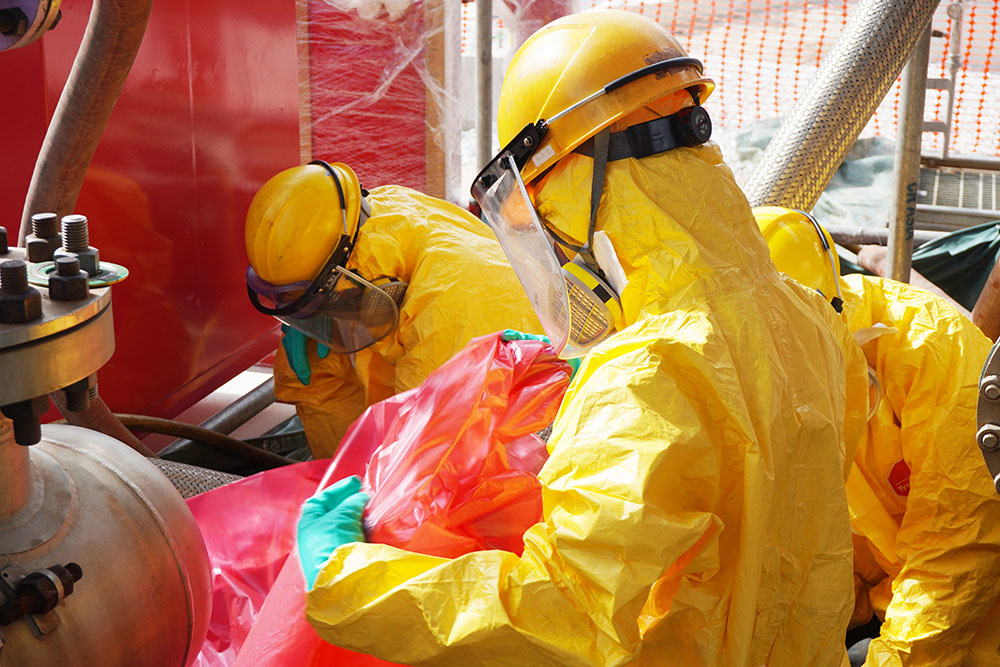What Do Companies Do To Prevent Chemical Spills?

CONTENTS
- Understanding the risks of chemical spills
- Regulatory frameworks governing chemical management
- Industry standards for chemical safety
- Advanced technologies in spill prevention
- Training and preparations for chemical spills
- Continuous improvement and spill prevention strategies
- Frequently asked questions
- Get in touch
When a chemical floods across a surface, a series of events can occur quickly, resulting in a company paying thousands of pounds and losing business. An oil spill in an industrial setting is entirely preventable, and many companies are responsible for keeping chemicals from spilling.
At ICE Cleaning, we provide specialised cleaning that includes chemical spill clean-up services. Our technicians can effectively tackle a chemical spill with advanced containment strategies and technology to isolate, decontaminate, and clean an affected area.
Read on to learn how businesses stay ahead of potential disasters and prevent dangerous consequences.
Understanding the risks of chemical spills
When thousands of litres of hazardous chemicals escape into an industrial site or local environment, the impact is staggering. From suffocating wildlife in their habitats to contaminating water supplies that communities rely on, chemical spills are dangerous, leaving long-lasting effects.
Workers can find themselves at risk; without proper safety measures, they are at risk of exposure to lethal fumes and liquids.
Businesses also face potential shutdowns, fines, and extensive chemical cleaning costs. The economic fallout can ripple outwards, affecting market stability and investor confidence.
Regulatory frameworks governing chemical management
The Control of Major Accident Hazards (COMAH) Regulations require companies to create an emergency response or spill control plan.
These ensure safe operation in any setting where hazardous materials and chemicals are utilised daily. This chemical spill control requires that a company have the following in place:
- Safety management systems
- Site emergency plans
- Emergency operating procedures and training
- Area evacuation plans
- Substance removal plans
- Stabilisation plans
- Spill kit and cleaning equipment
The Health and Safety Executive have created a specific page on their website, which documents all chemical-related legislation. These legislations are specifically enforced to protect the public and environment from accidental chemical exposure and spillages. These legislations include:
- CDG: Carriage of Dangerous Goods
- CLAW: Control of Lead at Work Regulations 2002 (CLAW)
- CLP: Classification, Labelling and Packaging of Substances and Mixtures (CLP Regulation), adopting in the EU the Globally Harmonised System (GHS)
- COPR: Control of Pesticides Regulations
- COSHH: Control of Substances Hazardous to Health
- DSEAR: The Dangerous Substances and Explosive Atmospheres Regulations 2002 (DSEAR)
- (PIC) Prior Informed Consent - Export and import of dangerous chemicals from and into Europe
- REACH: Registration, Evaluation, Authorisation & restriction of CHemicals (REACH)
Industry standards for chemical safety
Chemical safety is integral to the industry, where balance and precision are key. COMAH standards that companies follow prevent any major accidents with chemicals. These regulations ensure that companies strive for excellence whilst maintaining minimum legal requirements.
COSHH is an integral law in the UK which requires all companies to control exposure to certain materials at work that could harm individuals' health.
These can range from dust exposure to chemical burns in industrial settings - but COSHH affects all businesses that work with substances seen as hazardous.
The Health and Safety Executive provides resources for these laws and regulations, publishing safety and guidance sheets that outline measures and workplace exposure limits. These regulations and laws set a clear standard for preventing chemical spills and exposure.
Advanced technologies in spill prevention
As technology has advanced and our use of chemicals changes, various smart systems can predict a spill before it even happens. There are sensors that monitor chemical levels, ready to sound the alarm at any sign of a significant decrease to alert a potential leak or spill.
We also have automated monitoring machines working to track storage conditions. They send out real-time data, making it easier for teams to identify any troubling changes and prevent a spill.
Advanced containment solutions also exist to prevent spills before they occur, constantly improving every year to keep chemicals stored in a contained space properly. Some of these technologies include:
- Downflow booths - provide a working area for employees as they work with toxic substances
- Containment isolators - create a controlled atmosphere to prepare hazardous products
- Pack-off systems- designed to contain and protect during material discharges and off-loading
- Continuous liners - ensures a safe transfer of hazardous substances without breaking containment
- Laminar flow booths - a controlled work surface that provides filtered air towards the user
Training and preparations for chemical spills
When it comes to chemical spills, it is not just about having a plan in place, but also ensuring that everyone on your team is aware of what that plan entails.
In the event of a spill, time is integral, as even a small amount of the substance can quickly spread and cause harm. This is why it is crucial to have a well-prepared team that can respond quickly and efficiently.
To effectively tackle a chemical spill, you must have a clear understanding of the substance involved and the potential risks associated with it. This requires a comprehensive understanding of the chemicals utilised in your workplace and their properties and hazards.
With this knowledge, you can develop a spill response plan tailored to the specific needs of your workplace and the chemicals you handle.
Once you have a plan, you must ensure everyone on your team is familiar with it. This means providing regular training and drills to ensure that everyone knows what to do in the event of a spill.
It is also important that everyone has the necessary equipment and resources to respond to a spill, such as protective gear, spill kits, and communication devices.
In addition to having a well-prepared team, a successful spill response also requires solid teamwork. This means that everyone on your team must work together to contain the spill, preventing it from spreading.
This may involve assigning specific roles and responsibilities to each team member, such as overseeing the clean-up, monitoring the spill, or communicating with emergency responders.
Continuous improvement and spill prevention strategies
Chemical spills pose significant risks to both the environment and human health. Implementing preventive measures is crucial to minimise the likelihood of such incidents and their potential consequences. Some ways you can prevent spills and improve safety in the workplace include:
- Conducting frequent chemical spill risk assessments
- Implementing strict storage practices
- Investing in quality handling equipment
- Establishing training programmes
- Developing emergency response plans
- Regularly inspecting, maintaining, and cleaning equipment
- Work with local authorities for future emergencies
Frequently asked questions
How can we reduce chemical spillage?
To prevent spills, store chemicals securely, maintain equipment, and train staff well.
How do you prevent chemical splash?
Avoid splashes by using proper dispensing tools and safety gear like face shields
How can you protect yourself from a chemical spill?
In case of spills, wear the right PPE—gloves, goggles, aprons—and know your emergency plan.
Which is the best way to prevent a spill?
Implement strict handling protocols combined with regular audits. Tighten procedures and track performance diligently.
Get in touch
ICE Cleaning is an industrial cleaning company that provides chemical spill cleaning services nationwide. Our strategies can effectively contain a spill before it causes further damage, assisting staff in cleaning and decontaminating the affected area to ensure it is safe for work again.
To learn more about our chemical spillage cleaning services, get in touch with our team today at 0208 066 0360 or enquiries@icecleaning.co.uk. For chemical spills, we provide emergency services 24/7, all year round, so we can respond to your call immediately and arrive the same day as your initial call.

Speak with me today,
I’m here to help
By asking you a few questions either via phone or email I can immediately provide a realistic estimation of the cost.
You’re in good company. We’ve cleaned for the following commercial clients… View all

Why choose us?
- Cater to a wide variety of cleaning situations
- Nationwide coverage, available 24/7
- Cater to commercial and domestic clients
- Free survey provided prior to quotation
- Emergency response team
- Offer a bespoke service designed to suit all your needs
- All technicians hold professional health and safety qualifications, including BICSc, IOSH, Dewpoint Professional & Safe Contractor
We’re fully accredited
We place best practise, professional expertise and health and safety at the core of our business. We’re fully compliant with all legal obligations. You can view a list of our accreditations below, or visit our Health & Safety page for more information.











-RGB-small.1707319151.jpg)




















